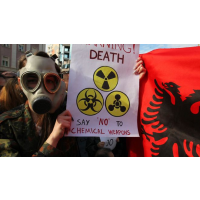Albania Still the Go-To Country for Dirty Work as U.S. Asks it to Take Syria’s Chemical Weapons

When the U.S. government has a dirty job that no other country will perform, it turns to Albania.
The small Balkan nation in southern Europe has helped the U.S. on multiple occasions, and now, it might end up destroying Syria’s stockpile of chemical weapons at Washington’s request.
Albania’s willingness to aid the U.S. started last decade, when it accepted ethnic Uighur prisoners from Guantánamo Bay after the United States couldn’t send them back to China because they would be punished in their native country.
Later, the Albanian government did the U.S. a favor by offering asylum to more than 200 members of the Mujahedin Khalq, the Iranian dissident group, after the American military decided to move them out of a camp in Iraq.
Now, the Obama administration needs a partner in getting rid of the chemical munitions belonging to the Bashar Assad regime.
Assad has agreed to the destruction of 1,300 tons of chemical agents and precursors, as well as another 1,200 tons of unfilled munitions, but only if the work is performed outside Syria. It is an operation that will cost tens of millions of dollars and is laced with environmental and security challenges.
The U.S. asked around the international community for help. Norway said it would transport the collection of sarin, VX and mustard gas, but not destroy them.
So a call was placed to Tirana, Albania’s capital. Officials there are reportedly mulling over the request to dispose of the Syrian arsenal.
Albania has experience destroying such weapons, having eliminated its own stockpile in 2007 (with technical help and $45 million in financial aid from the U.S.). In doing so, Albania became the first country to comply with the Chemical Weapons Convention. (After the destruction of 18 tons of mustard gas, toxic waste from that program remains stored in large containers at an unguarded army facility near the capital.)
But despite its success in eradicating its own chemical weapons, some Albanian officials want nothing to do with Syria’s lethal agents, not after their country stopped being “Europe’s garbage dump,” a distinction that evolved after years of importing non-hazardous waste from its neighbors, like Italy. In fact, a two-year campaign led by environmentalists produced a referendum that resulted in a government-sanctioned ban on importing waste products into the country.
Given that the Albanian government did not immediately refuse the U.S. request, and is in fact considering it, thousands of citizens have responded with angry demonstrations that have been going on for days in cities across the nation. “Taking in the weapons now for destruction, after imposing a ban on non-hazardous waste, is a tough sell,” Balkan Insight editor Besar Likmeta told The Los Angeles Times.
There have also been concerns about the government’s ability to handle the dangerous stockpile, particularly as memories are still fresh regarding a 2008 incident in which the dismantling of old artillery shells resulted in the deaths of 26 people and 300 injuries.
However, some believe that complying with the U.S. request might be in a feather in its cap in the eyes of Western nations and increase the odds of Albania being invited into the European Union. It would also bring money and equipment into the country, although how much that would be is mere speculation.
For now, the coalition government is split on the issue.
“Any possible ‘yes’ from us will be tied to a plan, which should be clear to everyone that Albania will benefit from,” Albania’s newly elected Socialist Party Prime Minister Edi Rama said in a statement.
- Danny Biederman, Noel Brinkerhoff
To Learn More:
Albania Asked to Host Destruction of Syria's Chemical Arsenal (by Shashank Bengali, Los Angeles Times)
Albanian Anger Builds Against Syrian Weapons Deal (by Besar Likmeta, Balkan Insight)
If Syria Can Destroy its Chemical Weapons, Shouldn’t the U.S. do the Same? (by Noel Brinkerhoff and Danny Biederman, AllGov)
- Top Stories
- Unusual News
- Where is the Money Going?
- Controversies
- U.S. and the World
- Appointments and Resignations
- Latest News
- Musk and Trump Fire Members of Congress
- Trump Calls for Violent Street Demonstrations Against Himself
- Trump Changes Name of Republican Party
- The 2024 Election By the Numbers
- Bashar al-Assad—The Fall of a Rabid AntiSemite






Comments